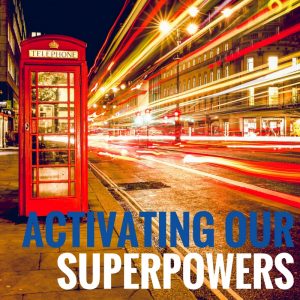Step back from your daily hustle for a moment.
See yourself as the main character in a movie about your very own life. Watch your day-to-day routines unfold. Your commute, conversations and the places and spaces where you spend time. Notice what makes you feel drained and what lights you up, what makes you feel flat or makes you laugh from the belly.
From that observer stance, ask:
Whose life are you living?
It can be an uncomfortable question for any of us. Perhaps we see ourselves living a life that our  families wanted for us. Perhaps it looks like a life we aspired to from a favorite book or movie and are trying it on for size. Perhaps it’s a life we stumbled into and decided to keep on rolling.
families wanted for us. Perhaps it looks like a life we aspired to from a favorite book or movie and are trying it on for size. Perhaps it’s a life we stumbled into and decided to keep on rolling.
This turns out to be a question worth contemplating sooner rather than later. A book chronicling The Top Five Regrets of the Dying shares a palliative nurse’s interviews with patients about their end-of-life reflections. The most common regret?
“I wish I’d had the courage to live a life true to myself, not the life others expected of me.”
Living a life true to oneself. Of course. At a deep level, we want that. Which begs the head-scratching question: What stops us?
As catchy as it sounds as a t-shirt slogan or blog title, living our truth is a radical act.
Over the years we’ve listened closely as our coaching clients, colleagues and loved ones wrestle with this desire to lead fulfilling lives. We continually explore it internally and amongst ourselves as a team.
Here are the biggest roadblocks we’ve encountered:
- I’d be letting people down by not fulfilling their visions for me.
- It seems so self-absorbed.
- I could become lost and rudderless if I deviate from the map.
- I risk failing at things that matter deeply to me. No shield of ‘I don’t care’ or ‘this is just for right now . . .’ to hide behind.
- I’m fine enough. Don’t rock the boat.
- I could lose everything . . . respect, relationships, status, opportunities, stability, all of the above.
- (The essential fear and dramatic winner of them all): What if I f*ck up every aspect of my entire life and never, ever recover?
Sensing the struggle? Peek under the hood of this question, and a machinery of fear and stress mechanisms abound. But look a little deeper, and there’s equally a sense of aspiration. A pull, however subtle, to live in accordance with ourselves.
Living true to self requires courage. Enduring, enormous courage. It means grabbing what we care most about and exposing it to others in our choices and actions, knowing that our core priorities may differ from loved ones and lead us in new directions.
It’s not the road of least resistance or obvious layout. We will still face challenges, have down days, navigate uncertainty, and make tough tradeoffs in order to live our truths.
If it’s so radical and challenging, why bother?
The “why bother?” point is a tricky pickle. On one side, it seems innately obvious that we’d want to lead genuine and fulfilling lives. On the other, why risk shaking ourselves up and testing our choices?
Living our truths in our daily and bigger-scale decisions has physical and relational benefits. To live inauthentically – that is, to put on a front that is out of sync with our actual inner experience – is to live a series of untruths. More bluntly known as … lies. Even seemingly insignificant lies, like pretending to be in a good mood or feigning enthusiasm for a new project assigned to us, trigger our stress response and create feelings of internal tension.
Take Dr. Christine Carter’s recent writeup on the costs of being a people pleaser. She recaps a study showing that participants who learned to lie less often showed decreased anxiety, improvements in relationships, and physical health benefits like better sleep and fewer headaches.
Ultimately, living lives untrue to ourselves can take a toll on our bodies and our connections.
Leading life true to self means being of service and generating meaningful impact. When listening to our core instincts for altruism, gratitude and connection, we are able to contribute beyond ourselves by drawing upon the very best of our makeup.
Even the very act of living true to ourselves is contagious, creating a groundswell of culture change and permission for others to live their truths. Courage begets courage.
Living our truth means we’re listening to and respecting our instincts. Not drowning out those instincts with excessive work, food, tv, booze, sex, shopping, media, etc. to numb the restlessness of living out-of-touch with ourselves.
At the essence, it means being alive and engaged instead of stale and victimized. Well-used and generative instead of boxed into formulaic steps. In the process we are creating a life that, at the end, allows us to utter the words: I was courageous and lived true to myself.
How?
What can help us live our truths going forward, instead of fretting about it in hindsight?
It’s a complex philosophy. We’re unpacking it into these foundational, actionable elements:
- Tuning into a guiding purpose. What do we feel drawn to serve?
- Living our values. Clarifying what we care most about and using these touchstones to direct ourselves.
- Switching on our dream machines. Conjuring up wider possibilities that could seem bizarre, unheard of, hilarious, epic.
- Activating our superpowers. Leveraging that unique sauce of skills and interests that each of us possesses.
- Befriending fear. Appreciating fears without letting them dominate every aspect of our lives.
- Finding our people. Creating connections and support that fuel our heartfelt lives.
 There are more ways to shape an authentic life, to be sure. We hope that starting with these elements nudges all of us to leap off the diving board and begin investigating for ourselves.
There are more ways to shape an authentic life, to be sure. We hope that starting with these elements nudges all of us to leap off the diving board and begin investigating for ourselves.
Over the next two pieces of this series, we delve into how we can digest and work with these concepts in our day-to-day lives. We then look at how those ingredients apply to our professional pursuits as we explore research on meaning-making at work.
This is not a simplistic framework. It is a way of living that is as complex and fluid as it is worthy and rewarding. Fortunately, it has tangible questions and practices to work with in the process. Most of all, it is one hell of an adventure to step into the challenge.
A coach is a great partner for clarifying the life vision that is true to you. The will also be your champion while you put that into action . Reach out to us to get started with a coach.
We want to hear from you!
Have a tricky work situation? Want our perspective? Ask 20 Rock to be considered for our monthly leadership support column: hello@20-rock.com
